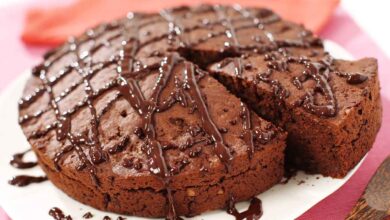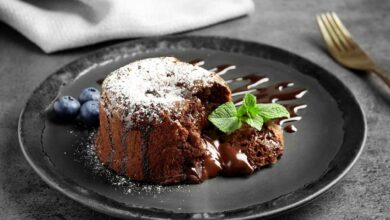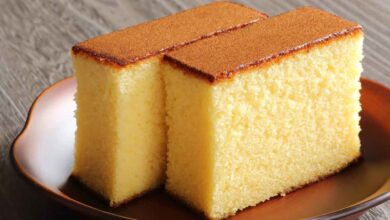Orange Yogurt Cake Recipe
There’s something magical about a cake that’s both simple to make and utterly delightful to taste, and this Orange Yogurt Cake is exactly that. Infused with the tangy sweetness of fresh oranges and the creaminess of yoghurt, this cake strikes a perfect balance between brightness and comfort.
Its moist texture and delicate crumb make it an ideal treat for any occasion—a cosy family gathering, an elegant brunch, or a quiet moment with a cup of tea. The yoghurt enhances the cake’s tenderness and adds a subtle tang that pairs beautifully with the citrus flavour.

Set your oven to 180°C (350°F). Ensure it’s fully preheated before you put the cake in to ensure even baking. Place your oven rack in the middle position for the best results. Grease a 9-inch (23 cm) round cake pan with butter or non-stick spray. Line the bottom of the pan with parchment paper to prevent sticking and for easy removal.
Measure out all ingredients accurately. Use a kitchen scale if you have one for precise measurements, as baking is all about balance. Make sure eggs, yoghurt, and oranges are at room temperature; this helps them blend smoothly into the batter. Wash and dry two medium oranges thoroughly. Use a microplane grater to zest both oranges.
Only grate the bright orange layer of the peel, avoiding the bitter white pith underneath. Collect the zest in a small bowl; this will be used to infuse the batter with flavor. Cut one of the zested oranges in half and squeeze out the juice. Use a fine-mesh strainer to remove seeds and pulp. You’ll need 1/4 cup (60 ml) of fresh orange juice for the batter.
In a medium-sized mixing bowl, sift together 2 cups of all-purpose flour, 2 tsp baking powder, 1/2 tsp baking soda and 1/4 tsp salt then whisk to combine. Use a whisk to evenly distribute the dry ingredients. Sifting and whisking help aerate the mixture, ensuring a light, fluffy cake. In a large mixing bowl, add: 1 cup (200 g) of granulated sugar and 2 large eggs.

Use an electric hand mixer or whisk to beat the sugar and eggs for about 2–3 minutes, until the mixture becomes pale, thick, and slightly frothy. This step incorporates air into the batter, helping the cake rise beautifully. Gradually pour in 1/2 cup (125 ml) vegetable oil (or melted butter) while continuing to whisk. Add 3/4 cup (180 g) of plain Greek yoghurt, whisking until the mixture is smooth and creamy.
Add the orange zest and 1/4 cup (60 ml) fresh orange juice to the wet mixture. Stir until the orange flavour is evenly distributed. Slowly add the dry ingredient mixture to the wet ingredients in three batches. Use a spatula or wooden spoon to gently fold the ingredients together after each addition. Use a gentle folding motion (scoop under the batter and fold over the top) to avoid overmixing.
Overmixing can activate the gluten in the flour, leading to a dense cake. Stop as soon as there are no visible streaks of flour. Transfer the batter to the prepared cake pan. Use a spatula to spread it evenly and smooth the surface. Place the pan in the preheated oven and bake for 35–40 minutes. Rotate the pan halfway through baking for even cooking.
Insert a toothpick or skewer into the centre of the cake. If it comes out clean or with a few moist crumbs, the cake is done. If wet batter clings to the toothpick, bake for an additional 3–5 minutes and check again. Remove the cake from the oven and let it cool in the pan for 10 minutes. Run a knife around the edges of the pan, then transfer the cake to a wire rack to cool completely.
SEE MORE;
Expert Tips for Success:
Room temperature ingredients: Cold eggs or yoghurt can cause the batter to curdle. Let them sit at room temperature for 30 minutes before starting.
Don’t skip the parchment paper: This ensures the cake is released cleanly from the pan, especially since this batter is moist.
Test early: Ovens vary, so check the cake at the 35-minute mark to prevent overbaking.
Orange freshness: Use fresh, juicy oranges for the best flavour. Bottled juice won’t give the same vibrant citrus punch.
Customization Ideas and Variations
Make it dairy-free: Use a plant-based yoghurt like almond, soy, or coconut. Replace butter with a neutral vegetable oil or dairy-free margarine.
Orange glaze topping: Mix 1/2 cup (60 g) powdered sugar with 2–3 tbsp fresh orange juice until smooth. Drizzle it over the cooled cake for a sweet, tangy finish.
Add a crunchy topping: Sprinkle the batter with sliced almonds or coarse sugar before baking for a crispy top.
Citrus twist: Add lemon zest and juice alongside the orange for a refreshing citrus medley.
Texture boosters: Fold in 1/2 cup (75 g) dried cranberries or chocolate chips for an extra burst of flavour.
Serving Suggestions:
For breakfast: Serve plain with a side of fresh fruit and a hot cup of coffee.
As a dessert: Pair with whipped cream or vanilla ice cream for an indulgent treat.
With tea or coffee: A lightly sweetened tea, such as Earl Grey or chamomile, complements the cake’s citrus flavour beautifully.
Storage, Reheating, and Make-Ahead Tips
Storage: Wrap the cake tightly in plastic wrap or place it in an airtight container. It will be kept for 3 days at room temperature or 1 week in the fridge.
Freezing: Wrap slices individually in plastic wrap and store them in a freezer-safe bag. Freeze for up to 3 months. Thaw overnight in the fridge before serving.
Reheating: To enjoy warm, microwave slices for 10–15 seconds.
This Orange Yogurt Cake is a versatile, foolproof recipe that you’ll want to bake on repeat. Its vibrant orange flavour, tender crumb, and effortless preparation make it a star in any baker’s repertoire.
Whether you’re sharing it with family or enjoying a quiet moment with a slice, this cake is bound to bring a touch of sunshine to your day. Why wait? Try it out and fall in love with every bite. Happy baking!
Ingredients;
- 2 cups (250 g/ 8.8 oz) all-purpose flour
- 2 tsp baking powder
- 1/2 tsp baking soda
- 1/4 tsp salt
- 1 cup (200 g/ 7 oz) granulated sugar
- 2 large eggs (room temperature)
- 1/2 cup (125 ml) vegetable oil (or melted butter)
- 3/4 cup (180 ml) plain Greek yogurt
- Zest of 2 medium oranges
- 1/4 cup (60 ml) fresh orange juice
Enjoy your baking adventure.










